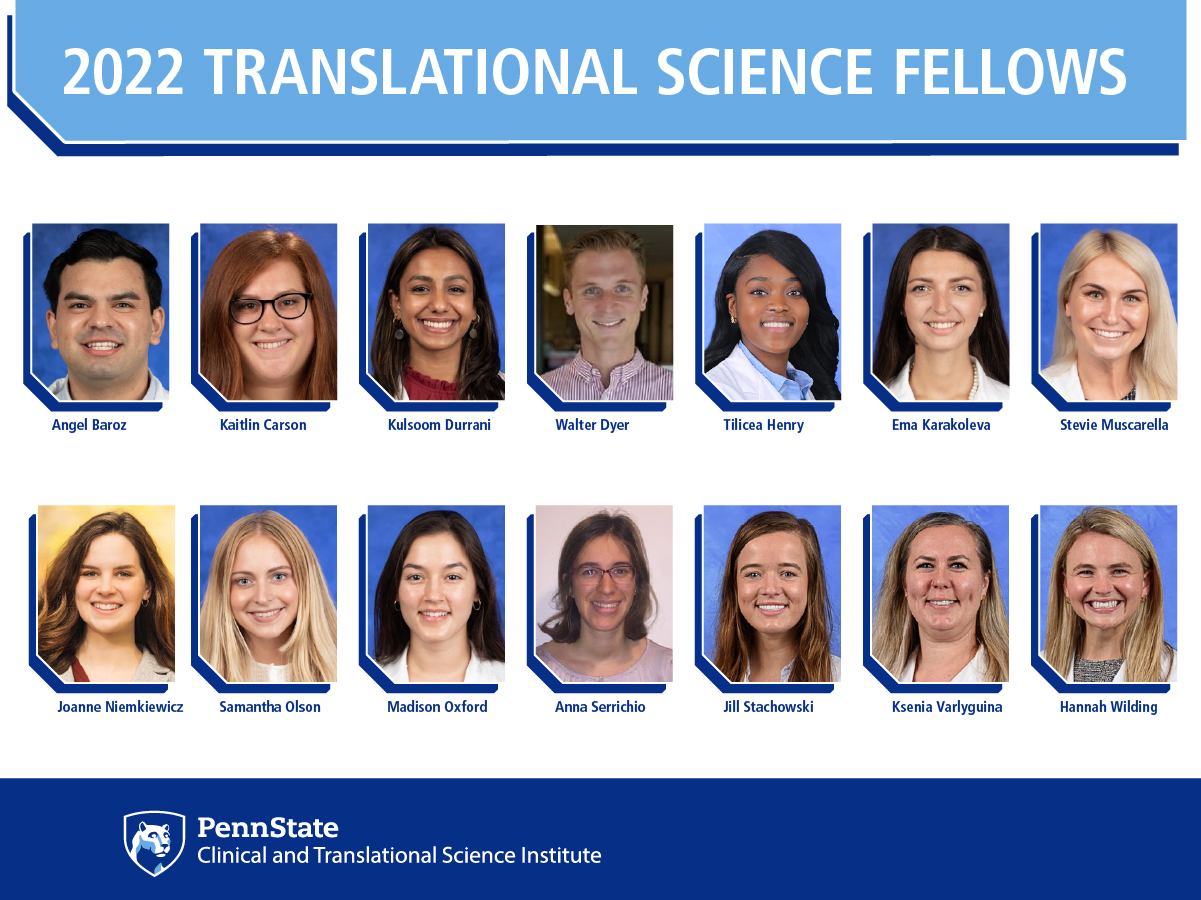2022 Translational Science Fellowship summer program now underway

Penn State helps students advance knowledge and skills in clinical and translational research
Graduate and medical students are gaining knowledge and skills in clinical and translational research through Penn State Clinical and Translational Science Institute’s 2022 Translational Science Fellowship program.
This year’s fellows include ten medical students and four graduate students representing four different programs from Penn State College of Medicine, Penn State College of Health and Human Development and Penn State College of Liberal Arts. Thirty-six percent of the participants identify as being part of groups historically underrepresented in biomedical research.
Targeted to early-stage learners, the program includes training in both foundational skills like research design and data analysis, and professional skills such as communication, ethics and teamwork. Penn State faculty and staff lead 20 sessions, held twice per week over five weeks, which stress individual and team learning over traditional lecture-style classes. Examples of real-world clinical and translational research are used throughout the course.
At the completion of the program sessions, fellows have the opportunity to apply these clinical and translational skills to their own mentored research projects.
This year’s fellows and research projects:
- Angel Baroz, medical student, College of Medicine, Hershey, with the project “The Impact of Race and Ethnicity on Patient Reported Smell Outcomes Following Nasal Surgery”
- Kaitlin Carson, graduate student, Neuroscience, College of Medicine, Hershey, with the project “Maternal Diet Alters Stress Responses in Vagal Circuits Controlling Gastric Function”
- Kulsoom Durrani, medical student, College of Medicine, Hershey, with the project “Therapeutic Effects of Pure Cannabinoids and Natural Cannabis Oils in an In-Vitro Osteoarthritis Model”
- Walter Dyer, graduate student, Clinical Psychology, College of Liberal Arts, University Park, with the project “An Examination of Subjective Craving Experiences in People Who Smoke Cigarettes”
- Tilicea Henry, medical student, College of Medicine, University Park, with the project “An Investigation of the Neurobiological Mechanisms Linking Social Stress and Tobacco Misuse”
- Ema Karakoleva, medical student, College of Medicine, Hershey, with the project “Characterizing the Role of Extracellular Vesicle-mediated Paracrine Communication in Retinal Pigment Epithelial Cell Disease”
- Stevie Muscarella, medical student, College of Medicine, Hershey, with the project “Defining the Relationship Between Sagittal Synostosis and Brain Volume Growth”
- Joanne Niemkiewicz, graduate student, Communication Sciences and Disorders, College of Health and Human Development, University Park, with the project “Exploring Semantic Networks and Creativity in People with Aphasia”
- Samantha Olson, medical student, College of Medicine, Hershey, with the project “How Does Awareness of Gender Bias Impact Clinical Decision Making Within the Orthopaedic Surgery Department at Hershey Medical Center”
- Madison Oxford, medical student, College of Medicine, Hershey, with the project “Assessing Attitudes Towards and Uptake of Human Papillomavirus Vaccination Among U.S. Medical Residents in High Exposure Risk Specialties”
- Anna Serrichio, graduate student, Communication Sciences and Disorders, College of Health and Human Development, University Park, with the project “An Examination of the Interplay of Attention, Working Memory, and Language Abilities in Individuals with Aphasia and Neurologically Intact Controls using Resting State fMRI”
- Jill Stachowski, medical student, College of Medicine, University Park, with the project “Understanding the Prevalence of Allergic Contact Dermatitis Due to Cosmetics Over Time”
- Ksenia Varlyguina, medical student, College of Medicine, Hershey, with the project “Medication Abortion Care in Family Medicine: Synthesizing the Research and Characterizing our Context in Rural, Central Pennsylvania”
- Hannah Wilding, medical student, College of Medicine, Hershey, with the project “Longitudinal in Vivo 5-ALA Based Photodynamic Therapy and Metabolic Imaging for Glioblastoma”
This program is funded through the institute’s TL1 Training Program grant through the Clinical and Translational Science Award of the National Center for Advancing Translational Sciences.
If you're having trouble accessing this content, or would like it in another format, please email Penn State Health Marketing & Communications.
